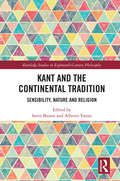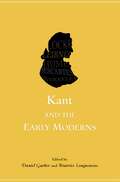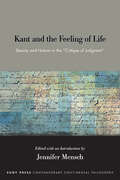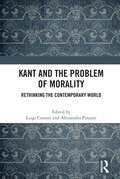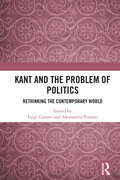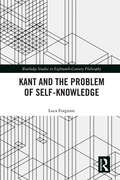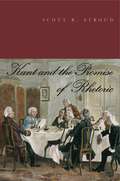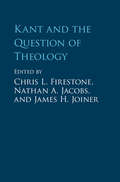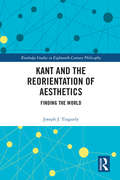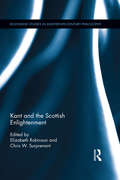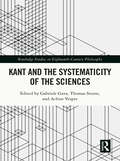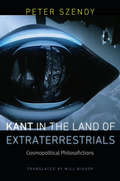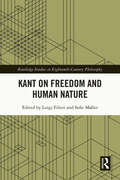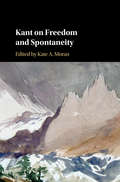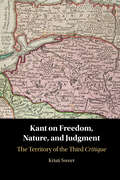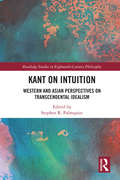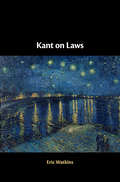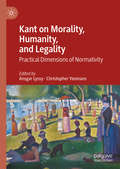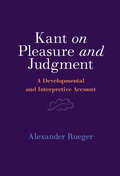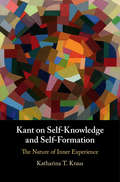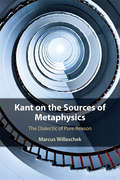- Table View
- List View
Kant and the Continental Tradition: Sensibility, Nature, and Religion (Routledge Studies in Eighteenth-Century Philosophy)
by Sorin Baiasu Alberto VanzoImmanuel Kant’s work continues to be a main focus of attention in almost all areas of philosophy. The significance of Kant’s work for the so-called continental philosophy cannot be exaggerated, although work in this area is relatively scant. The book includes eight chapters, a substantial introduction and a postscript, all newly written by an international cast of well-known authors. Each chapter focuses on particular aspects of a fundamental problem in Kant’s and post-Kantian philosophy, the problem of the relation between the world and transcendence. Chapters fall thematically into three parts: sensibility, nature and religion. Each part starts with a more interpretative chapter focusing on Kant’s relevant work, and continues with comparative chapters which stage dialogues between Kant and post-Kantian philosophers, including Martin Heidegger, Hannah Arendt, Jean-François Lyotard, Luce Irigaray and Jacques Derrida. A special feature of this volume is the engagement of each chapter with the work of the late British philosopher Gary Banham. The Postscript offers a subtle and erudite analysis of his intellectual trajectory, philosophy and mode of working. The volume is dedicated to his memory.
Kant and the Early Moderns
by Daniel Garber and Béatrice LonguenesseFor the past 200 years, Kant has acted as a lens--sometimes a distorting lens--between historians of philosophy and early modern intellectual history. Kant's writings about Descartes, Leibniz, Locke, Berkeley, and Hume have been so influential that it has often been difficult to see these predecessors on any terms but Kant's own. In Kant and the Early Moderns, Daniel Garber and Béatrice Longuenesse bring together some of the world's leading historians of philosophy to consider Kant in relation to these earlier thinkers. These original essays are grouped in pairs. A first essay discusses Kant's direct engagement with the philosophical thought of Descartes, Leibniz, Locke, Berkeley, or Hume, while a second essay focuses more on the original ideas of these earlier philosophers, with reflections on Kant's reading from the point of view of a more direct interest in the earlier thinker in question. What emerges is a rich and complex picture of the debates that shaped the "transcendental turn" from early modern epistemology, metaphysics, and philosophy of mind to Kant's critical philosophy. The contributors, in addition to the editors, are Jean-Marie Beyssade, Lisa Downing, Dina Emundts, Don Garrett, Paul Guyer, Anja Jauernig, Wayne Waxman, and Kenneth P. Winkler.
Kant and the Feeling of Life: Beauty and Nature in the Critique of Judgment (SUNY series in Contemporary Continental Philosophy)
by Jennifer MenschKant and the Feeling of Life positions Kant's concept of life as a guiding thread for understanding not only Kant's approach to aesthetics and teleology but the underlying unity of the Critique of Judgment itself. The "feeling of life," which Kant describes as affecting us in various ways—as animating, enlivening, and quickening the mind—lies at the heart of Kant's philosophical project, but it has remained understudied for a theme of such centrality. This volume brings together, for the first time, essays focused on the topic of life in Kant's work, providing a wealth of perspectives and analyses ranging from the Critique of Judgment to Kant's early aesthetics, his social and political philosophy, his work connected to the body and health, and his moral theory.
Kant and the Problem of Morality: Rethinking the Contemporary World
by Alessandro Pinzani Luigi CarantiThis book examines the significance of Kant’s moral philosophy in contemporary philosophical debates. It argues that Kant’s philosophy can still serve as a guide to navigate the turbulence of a globalized world in which we are faced by an imprescriptible social reality wherein moral values and ethical life models are becoming increasingly unstable. The volume draws on Kantian ethics to discuss various contemporary issues, including sustainable development, moral enhancement, sexism, and racism. It also tackles general concepts of practical philosophy such as lying, the different kinds of moral duties, and the kind of motivation one needs for doing what we consider the right thing. Featuring readings by well-known Kant specialists and emerging scholars with unorthodox approaches to Kant’s philosophy, the volume will be of great interest to scholars and researchers of philosophy, politics and ethics. It will also appeal to moral theorists, applied ethicists and environmental theorists.
Kant and the Problem of Politics: Rethinking the Contemporary World
by Alessandro Pinzani Luigi CarantiThis book examines the significance of Kant’s political philosophy in the context of contemporary philosophical and political debates. In the last few decades, Kantian specialists have increasingly manifested a purely exegetic and philological interest in Kant’s oeuvre, while contemporary philosophers and scientists tend to use Kant with scant hermeneutical care, thus misrepresenting or misunderstanding his positions. This volume countervails these tendencies by focusing more on specific themes of contemporary relevance in Kant’s writings. It looks to Kant’s political thought for insight on tackling issues such as freedom of speech, democracy and populism, intergenerational justice, economic inequality, money, poverty, international justice, and gender/feminism. Featuring readings by well-known Kant specialists and emerging scholars with unorthodox approaches to Kant’s philosophy, the volume fills a significant gap in the existing scholarship on the philosopher and his works. It will be of great interest to scholars and researchers of philosophy, politics, and ethics.
Kant and the Problem of Self-Knowledge (Routledge Studies in Eighteenth-Century Philosophy)
by Luca ForgioneThis book addresses the problem of self-knowledge in Kant’s philosophy. As Kant writes in his major works of the critical period, it is due to the simple and empty representation ‘I think’ that the subject’s capacity for self-consciousness enables the subject to represent its own mental dimension. This book articulates Kant’s theory of self-knowledge on the basis of the following three philosophical problems: 1) a semantic problem regarding the type of reference of the representation ‘I’; 2) an epistemic problem regarding the type of knowledge relative to the thinking subject produced by the representation ‘I think’; and 3) a strictly metaphysical problem regarding the features assigned to the thinking subject’s nature. The author connects the relevant scholarly literature on Kant with contemporary debates on the huge philosophical field of self-knowledge. He develops a formal reading according to which the unity of self-consciousness does not presuppose the identity of a real subject, but a formal identity based on the representation ‘I think’.
Kant and the Promise of Rhetoric
by Scott R. StroudImmanuel Kant is rarely connected to rhetoric by those who study philosophy or the rhetorical tradition. If anything, Kant is said to see rhetoric as mere manipulation and as not worthy of attention. In Kant and the Promise of Rhetoric, Scott Stroud presents a first-of-its-kind reappraisal of Kant and the role he gives rhetorical practices in his philosophy. By examining the range of terms that Kant employs to discuss various forms of communication, Stroud argues that the general thesis that Kant disparaged rhetoric is untenable. Instead, he offers a more nuanced view of Kant on rhetoric and its relation to moral cultivation. For Kant, certain rhetorical practices in education, religious settings, and public argument become vital tools to move humans toward moral improvement without infringing on their individual autonomy. Through the use of rhetorical means such as examples, religious narratives, symbols, group prayer, and fallibilistic public argument, individuals can persuade other agents to move toward more cultivated states of inner and outer autonomy. For the Kant recovered in this book, rhetoric becomes another part of human activity that can be animated by the value of humanity, and it can serve as a powerful tool to convince agents to embark on the arduous task of moral self-cultivation.
Kant and the Promise of Rhetoric
by Scott R. StroudImmanuel Kant is rarely connected to rhetoric by those who study philosophy or the rhetorical tradition. If anything, Kant is said to see rhetoric as mere manipulation and as not worthy of attention. In Kant and the Promise of Rhetoric, Scott Stroud presents a first-of-its-kind reappraisal of Kant and the role he gives rhetorical practices in his philosophy. By examining the range of terms that Kant employs to discuss various forms of communication, Stroud argues that the general thesis that Kant disparaged rhetoric is untenable. Instead, he offers a more nuanced view of Kant on rhetoric and its relation to moral cultivation. For Kant, certain rhetorical practices in education, religious settings, and public argument become vital tools to move humans toward moral improvement without infringing on their individual autonomy. Through the use of rhetorical means such as examples, religious narratives, symbols, group prayer, and fallibilistic public argument, individuals can persuade other agents to move toward more cultivated states of inner and outer autonomy. For the Kant recovered in this book, rhetoric becomes another part of human activity that can be animated by the value of humanity, and it can serve as a powerful tool to convince agents to embark on the arduous task of moral self-cultivation.
Kant and the Question of Theology
by James H. Jacobs Joiner Nathan A. Firestone Chris L.God is a problematic idea in Kant's terms, but many scholars continue to be interested in Kantian theories of religion and the issues that they raise. In these new essays, scholars both within and outside Kant studies analyse Kant's writings and his claims about natural, philosophical, and revealed theology. Topics debated include arguments for the existence of God, natural theology, redemption, divine action, miracles, revelation, and life after death. The volume includes careful examination of key Kantian texts alongside discussion of their themes from both constructive and analytic perspectives. These contributions broaden the scope of the scholarship on Kant, exploring the value of doing theology in consonance or conversation with Kant. It builds bridges across divides that often separate the analytic from the continental and the philosophical from the theological. The resulting volume clarifies the significance and relevance of Kant's theology for current debates about the philosophy of God and religion.
Kant and the Reorientation of Aesthetics (Routledge Studies in Eighteenth-Century Philosophy)
by Joseph J. TinguelyThis book argues that the philosophical significance of Kant’s aesthetics lies not in its explicit account of beauty but in its implicit account of intentionality. Kant’s account is distinct in that feeling, affect, or mood must be operative within the way the mind receives the world. Moreover, these modes of receptivity fall within the normative domain so that we can hold each other responsible for how we are "struck" by an object or scene. Joseph Tinguely composes a series of investigations into the philosophically rich but regrettably neglected topics at the intersection of Kant’s aesthetics and epistemology, such as how we orient ourselves in the world, whether tonality is a property of the subject or object, and what we hope to accomplish when we quarrel about taste. Taken together, these investigations offer a robust and defensible picture of mind, which not only resolves tensions in a Kantian account of intentionality but also offers a timely intervention into contemporary debates about the "aesthetic" nature of the way the mind is in touch with the world. Kant and the Reorientation of Aesthetics will appeal to scholars and students of Kant, as well as those working at the intersection of aesthetics and philosophy of mind.
Kant and the Scottish Enlightenment (Routledge Studies in Eighteenth-Century Philosophy)
by Elizabeth Robinson Chris W. SurprenantMost academic philosophers and intellectual historians are familiar with the major historical figures and intellectual movements coming out of Scotland in the 18th Century. These scholars are also familiar with the works of Immanuel Kant and his influence on Western thought. But with the exception of discussion examining David Hume’s influence on Kant’s epistemology, metaphysics, and moral theory, little attention has been paid to the influence of the Scottish Enlightenment thinkers on Kant’s philosophy. This volume aims to fill this perceived gap in the literature and provide a starting point for future discussions looking at the influence of Hume, Thomas Reid, Adam Smith, and other Scottish Enlightenment thinkers on Kant’s philosophy.
Kant and the Systematicity of the Sciences (Routledge Studies in Eighteenth-Century Philosophy)
by Thomas Sturm Gabriele Gava Achim VesperThis book provides the first comprehensive discussion regarding the role that Kant ascribes to systematicity in the sciences. It considers not only what Kant has to say on systematicity in general, but also how the systematicity requirement for science is specified in different fields of knowledge.The chapters are divided into three thematic sections. Part I is devoted to historical context. The chapters explore precursors of Kant’s account of the systematicity of the sciences. Part II addresses the application of systematicity to the special sciences – cosmology, physics, chemistry, logic, mathematics, the life sciences, and history. Finally, Part III explores the systematicity of philosophy.Kant and the Systematicity of the Sciences will be of interest to scholars and advanced students working on Kant and the history and philosophy of science.
Kant in the Land of Extraterrestrials: Cosmopolitical Philosofictions
by Peter Szendy“Yes, Kant did indeed speak of extraterrestrials.” This phrase could provide the opening for this brief treatise of philosofiction (as one speaks of science fiction). What is revealed in the aliens of which Kant speaks—and he no doubt took them more seriously than anyone else in the history of philosophy—are the limits of globalization, or what Kant called cosmopolitanism.Before engaging Kantian considerations of the inhabitants of other worlds, before comprehending his reasoned alienology, this book works its way through an analysis of the star wars raging above our heads in the guise of international treaties regulating the law of space, including the cosmopirates that Carl Schmitt sometimes mentions in his late writings.Turning to track the comings and goings of extraterrestrials in Kant’s work, Szendy reveals that they are the necessary condition for an unattainable definition of humanity. Impossible to represent, escaping any possible experience, they are nonetheless inscribed both at the heart of the sensible and as an Archimedean point from whose perspective the interweavings of the sensible can be viewed.Reading Kant in dialogue with science fiction films (films he seems already to have seen) involves making him speak of questions now pressing in upon us: our endangered planet, ecology, a war of the worlds. But it also means attempting to think, with or beyond Kant, what a point of view might be.
Kant on Freedom and Human Nature (Routledge Studies in Eighteenth-Century Philosophy)
by Sofie Møller Luigi FilieriThe essays in this volume provide new readings of Kant’s account of human nature. Despite the relevance of human nature to Kant’s philosophy, little attention has been paid to the fact that the question about human nature originally pertains to pure reason. The chapters in this volume show that Kant’s point is not to state once and for all what the human being actually is, but to unite pure reason’s efforts within a unitary teleological perspective. The question about human nature is the cornerstone of reason’s unity in its different activities and domains. Kant’s question about human nature goes beyond our empirical inquiries to show that the notion of humanity represents the point of convergence and unity of pure reason’s most fundamental interests. Kant on Freedom and Human Nature will appeal to scholars and advanced students working on Kant’s philosophy.
Kant on Freedom and Human Nature (Routledge Studies in Eighteenth-Century Philosophy)
by Sofie Møller Luigi FilieriThe essays in this volume provide new readings of Kant’s account of human nature.Despite the relevance of human nature to Kant’s philosophy, little attention has been paid to the fact that the question about human nature originally pertains to pure reason. The chapters in this volume show that Kant’s point is not to state once and for all what the human being actually is, but to unite pure reason’s efforts within a unitary teleological perspective. The question about human nature is the cornerstone of reason’s unity in its different activities and domains. Kant’s question about human nature goes beyond our empirical inquiries to show that the notion of humanity represents the point of convergence and unity of pure reason’s most fundamental interests.Kant on Freedom and Human Nature will appeal to scholars and advanced students working on Kant’s philosophy.
Kant on Freedom and Spontaneity
by Kate A. MoranSpontaneity - understood as an action of the mind or will that is not determined by a prior external stimulus - is a theme that resonates throughout Immanuel Kant's theoretical and practical philosophy. Though spontaneity and the concomitant notion of freedom lie at the foundation of many of Kant's most pivotal theses and arguments regarding cognition, judgment, and moral action, spontaneity and freedom themselves often remain cloaked in mystery, or accessible only via transcendental argument. This volume brings together a distinguished group of scholars who explore the nature of freedom and spontaneity, the arguments Kant offers surrounding these concepts, and their place in Kant's larger philosophical system. The collection will be of interest to scholars interested in any aspect of Kant's philosophy, especially those who hope to gain a deeper insight into these fundamental Kantian ideas.
Kant on Freedom, Nature, and Judgment: The Territory of the Third Critique
by Kristi SweetKant's Critique of Judgment seems not to be an obviously unified work. Unlike other attempts to comprehend it as a unity, which treat it as serving either practical or theoretical interests, Kristi Sweet's book posits it as examining a genuinely independent sphere of human life. In her in-depth account of Kant's Critical philosophical system, Sweet argues that the Critique addresses the question: for what may I hope? The answer is given in Kant's account of 'territory,' a region of experience that both underlies and mediates between freedom and nature. Territory forms the context in which purposiveness without a purpose, the Ideal of Beauty, the sensus communis, genius and aesthetic ideas, and Kant's conception of life and proof of God are best interpreted. Encounters in this sphere are shown to refer us to a larger, more cosmic sense of a whole to which both freedom and nature belong.
Kant on Intuition: Western and Asian Perspectives on Transcendental Idealism (Routledge Studies in Eighteenth-Century Philosophy)
by Stephen R. PalmquistKant on Intuition: Western and Asian Perspectives on Transcendental Idealism consists of 20 chapters, many of which feature engagements between Kant and various Asian philosophers. Key themes include the nature of human intuition (not only as theoretical—pure, sensible, and possibly intellectual—but also as relevant to Kant’s practical philosophy, aesthetics, the sublime, and even mysticism), the status of Kant’s idealism/realism, and Kant’s notion of an object. Roughly half of the chapters take a stance on the recent conceptualism/non-conceptualism debate. The chapters are organized into four parts, each with five chapters. Part I explores themes relating primarily to the early sections of Kant’s first Critique: three chapters focus mainly on Kant’s theory of the "forms of intuition" and/or "formal intuition", especially as illustrated by geometry, while two examine the broader role of intuition in transcendental idealism. Part II continues to examine themes from the Aesthetic but shifts the main focus to the Transcendental Analytic, where the key question challenging interpreters is to determine whether intuition (via sensibility) is ever capable of operating independently from conception (via understanding); each contributor offers a defense of either the conceptualist or the non-conceptualist readings of Kant’s text. Part III includes three chapters that explore the relevance of intuition to Kant’s theory of the sublime, followed by two that examine challenges that Asian philosophers have raised against Kant’s theory of intuition, particularly as it relates to our experience of the supersensible. Finally, Part IV concludes the book with five chapters that explore a range of resonances between Kant and various Asian philosophers and philosophical ideas.
Kant on Laws
by Eric WatkinsThis book focuses on the unity, diversity, and centrality of the notion of law as it is employed in Kant's theoretical and practical philosophy. Eric Watkins argues that, by thinking through a number of issues in various historical, scientific, and philosophical contexts over several decades, Kant is able to develop a univocal concept of law that can nonetheless be applied to a wide range of particular cases, despite the diverse demands that these contexts give rise to. In addition, Watkins shows how Kant comes to view both the generic conception of law which he develops and its different particular instances as crucial components of his systematic philosophy as a whole. This volume's new and unified account of a major current running through Kant's work will be important for scholars interested in numerous aspects of his philosophy, from the theoretical and abstract to the practical and empirical.
Kant on Moral Autonomy
by Oliver SensenThe concept of autonomy is one of Kant's central legacies for contemporary moral thought. We often invoke autonomy as both a moral ideal and a human right, especially a right to determine oneself independently of foreign determinants; indeed, to violate a person's autonomy is considered to be a serious moral offence. Yet while contemporary philosophy claims Kant as the originator of its notion of autonomy, Kant's own conception of the term seems to differ in important respects from our present-day interpretation. Kant on Moral Autonomy brings together a distinguished group of scholars who explore the following questions: what is Kant's conception of autonomy? What is its history and its influence on contemporary conceptions? And what is its moral significance? Their essays will be of interest both to scholars and students working on Kantian moral philosophy and to anyone interested in the subject of autonomy.
Kant on Morality, Humanity, and Legality: Practical Dimensions of Normativity
by Ansgar Lyssy Christopher YeomansIt was not so long ago that the dominant picture of Kant’s practical philosophy was formalistic, focusing almost exclusively on his Groundwork of the Metaphysics of Morals and Critique of Practical Reason. However, the overall picture of Kant’s wide-ranging philosophy has since been broadened and deepened. We now have a much more complete understanding of the range of Kant’s practical interests and of his contributions to areas as diverse as anthropology, pedagogy, and legal theory. What remains somewhat obscure, however, is how these different contributions hang together in the way that Kant suggests that they must. This book explores these different conceptions of humanity, morality, and legality in Kant as main ‘manifestations’ or ‘dimensions’ of practical normativity. These interrelated terms play a crucial role in highlighting different rational obligations, their source(s), and their applicability in the face of changing circumstances.
Kant on Pleasure and Judgment: A Developmental and Interpretive Account
by Alexander RuegerWere there interactions between the development of Kant's aesthetics and the development of his moral philosophy? How did Kant view pleasure and displeasure and what role did they play in the formation of his system of the faculties? In this book, Alexander Rueger situates Kant's account of pleasure and displeasure in its eighteenth-century context, with special attention to Leibniz, Wolff, Crusius, and Mendelssohn. He traces the development of Kant's views on pleasure from the 1770s to his Critique of Aesthetic Judgment in 1790, and shows that throughout, Kant understood pleasure as the satisfaction of faculty interests. The significance of this theory for the completion of Kant's critical system in the third Critique is discussed in detail. Rueger's study illuminates both the role of pleasure and displeasure in Kant's thought, and their important connections to the power of judgment.
Kant on Practical Life
by Kristi E. SweetKant's 'practical philosophy' comprehends a diverse group of his writings on ethics, politics, law, religion, and the philosophy of history and culture. Kristi E. Sweet demonstrates the unity and interdependence of these writings by showing how they take as their animating principle the human desire for what Kant calls the unconditioned - understood in the context of his practical thought as human freedom. She traces the relationship between this desire for freedom and the multiple forms of finitude that confront human beings in different aspects of practical life, and stresses the interdependence of the pursuit of individual moral goodness and the formation of community through the state, religion, culture and history. This study of Kant's approach to practical life discovers that doing our duty, itself the realization of our individual freedom, requires that we set for ourselves and pursue a whole constellation of social, political and other communal ends.
Kant on Self-Knowledge and Self-Formation: The Nature of Inner Experience
by Katharina T. KrausAs the pre-eminent Enlightenment philosopher, Kant famously calls on all humans to make up their own minds, independently from the constraints imposed on them by others. Kant's focus, however, is on universal human reason, and he tells us little about what makes us individual persons. In this book, Katharina T. Kraus explores Kant's distinctive account of psychological personhood by unfolding how, according to Kant, we come to know ourselves as such persons. Drawing on Kant's Critical works and on his Lectures and Reflections, Kraus develops the first textually comprehensive and systematically coherent account of our capacity for what Kant calls 'inner experience'. The novel view of self-knowledge and self-formation in Kant that she offers addresses present-day issues in philosophy of mind and will be relevant for contemporary philosophical debates. It will be of interest to scholars of the history of philosophy, as well as of philosophy of mind and psychology.
Kant on the Sources of Metaphysics: The Dialectic of Pure Reason
by Marcus WillaschekIn the Critique of Pure Reason, Kant famously criticizes traditional metaphysics and its proofs of immortality, free will and God's existence. What is often overlooked is that Kant also explains why rational beings must ask metaphysical questions about 'unconditioned' objects such as souls, uncaused causes or God, and why answers to these questions will appear rationally compelling to them. In this book, Marcus Willaschek reconstructs and defends Kant's account of the rational sources of metaphysics. After carefully explaining Kant's conceptions of reason and metaphysics, he offers detailed interpretations of the relevant passages from the Critique of Pure Reason (in particular, the 'Transcendental Dialectic') in which Kant explains why reason seeks 'the unconditioned'. Willaschek offers a novel interpretation of the Transcendental Dialectic, pointing up its 'positive' side, while at the same time it uncovers a highly original account of metaphysical thinking that will be relevant to contemporary philosophical debates.
